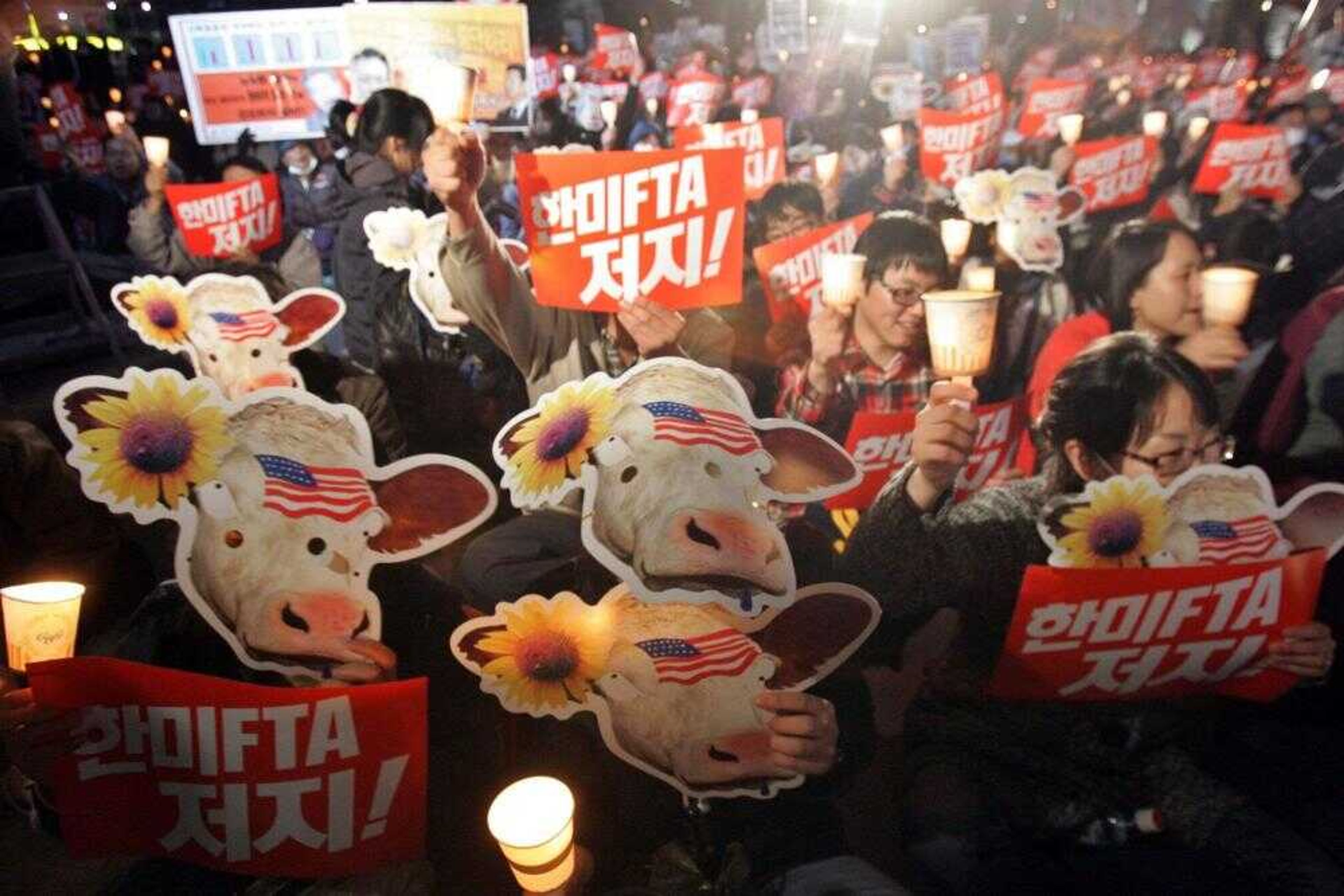South Korea, U.S. try to salvage free trade deal amid protests
SEOUL, South Korea -- South Korea and the United States were taking a hard look at a possible free-trade agreement today, a spokesman for the U.S. negotiators said, hoping to clinch the elusive deal after almost 10 months of contentious talks. "Basically, the deal's on the table," said Steve Norton, spokesman for the Office of the U.S. Trade Representative, three hours after a deadline to conclude negotiations had passed. "Both sides are huddling to see if they can accept it."...
SEOUL, South Korea -- South Korea and the United States were taking a hard look at a possible free-trade agreement today, a spokesman for the U.S. negotiators said, hoping to clinch the elusive deal after almost 10 months of contentious talks.
"Basically, the deal's on the table," said Steve Norton, spokesman for the Office of the U.S. Trade Representative, three hours after a deadline to conclude negotiations had passed. "Both sides are huddling to see if they can accept it."
Negotiators have met for eight straight days of grueling talks at a Seoul hotel. If they succeed, the accord to slash tariffs and other trade barriers would be the biggest for Washington since the North American Free Trade Agreement in 1993, and the biggest ever for South Korea.
After an all-night session Friday, the two sides said they needed to extend talks beyond the original midnight deadline, and agreed to finish the talks by 1 a.m. today local time in Seoul, corresponding to a noon Sunday deadline in Washington.
The negotiations were marred by ugly protests outside the luxury hilltop hotel where delegates met. A man shouted "Stop the Korea-U.S. FTA" after setting himself on fire. He was treated for third-degree burns, police said.
Nearby, about 150 protesters, including farmers, students and activists, some wearing red or white headbands, denounced the talks, chanting "Down with the Roh Moo-hyun government," referring to South Korea's president.
A brief clash between some of the protesters and riot police carrying shields and truncheons erupted later, with one policeman falling to the ground bloodied. After dark, protesters gathered in front of Seoul City Hall for a candlelight protest, holding placards and chanting.
Police estimated the crowd at about 1,000 people. The protesters then marched through central Seoul toward the presidential Blue House, but they were checked by riot police.
South Korean Trade Minister Kim Hyun-chong and Deputy U.S. Trade Representative Karan Bhatia, as well as the chief negotiators for the two sides, have been meeting since March 26 to bridge contentious trade issues such as autos and agriculture.
The White House on Friday said that after 10 months of haggling, the talks were "not going well."
A USTR spokesman in Washington said Saturday that the United States must wrap up the deal by Sunday U.S. time. That is the deadline to notify Congress that President Bush does or does not intend to sign a deal under his expiring Trade Promotion Authority.
That "fast track" power to submit trade agreements to Congress for straight yes-or-no votes expires July 1, but legally the agreement must be concluded 90 days in advance.
Norton said Sunday there would be no further extension of talks.
Any final deal would be subject to approval by both Congress and South Korea's National Assembly.
South Korea has refused to include its $9.1 billion rice market in a deal, saying the staple food is a "sensitive sector."
"The U.S. side has paid great attention to our situation and position, and I believe their understanding has also been greatly raised," Min Dong-seok, deputy minister for trade at the Agriculture and Forestry Ministry, told reporters.
Other bottlenecks include trade in autos, Seoul's demand that goods made in a small North Korean industrial zone by South Korean companies be included, and the status of U.S. beef, absent from South Korean markets for more than three years after mad cow disease was discovered in the United States.
Officials on both sides say an agreement would boost economic ties between two longtime allies, which already amounts to more than $75 billion in annual trade.
South Korean opponents -- including labor, farm and anti-globalization activists-- say an influx of U.S. products would cost jobs.
A protest in July drew 25,000 people and last week, 7,000 people rallied in front of the U.S. Embassy.
Connect with the Southeast Missourian Newsroom:
For corrections to this story or other insights for the editor, click here. To submit a letter to the editor, click here. To learn about the Southeast Missourian’s AI Policy, click here.








